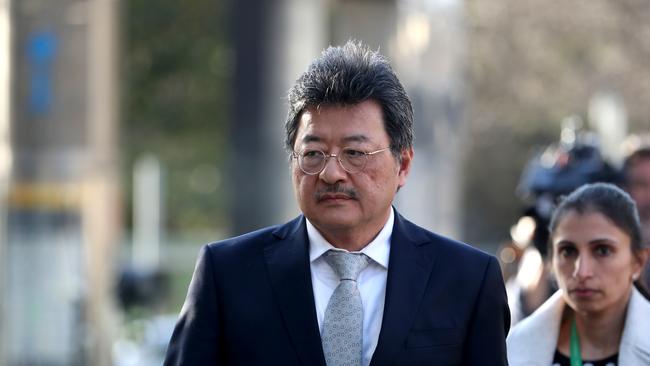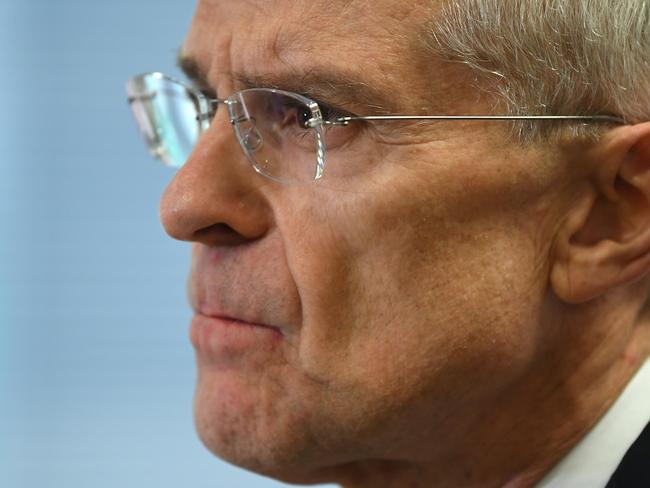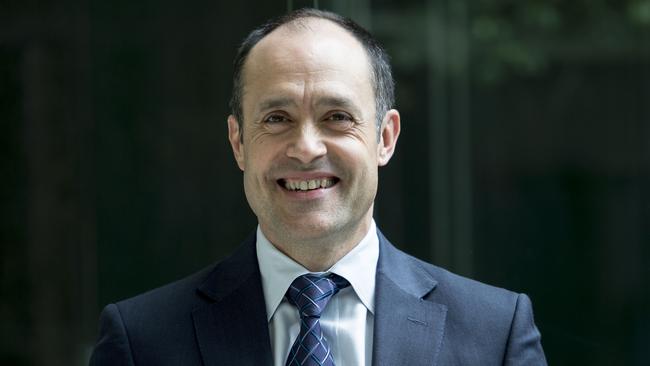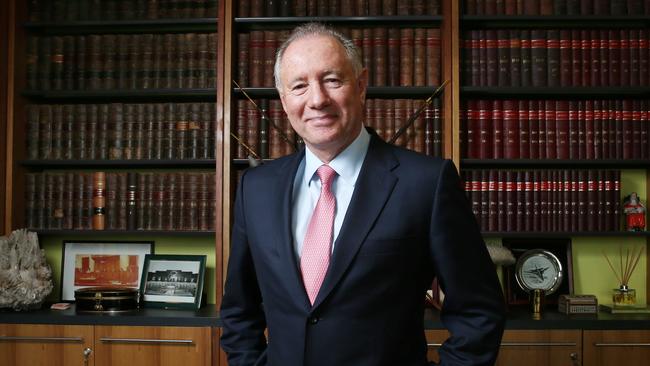TPG merger with Vodafone cleared by Federal Court
Shares in TPG surge 20 per cent after telco is given the green light from the Federal Court to push ahead with a $15bn merger.

The Federal Court has declared a merger TPG and Vodafone will create a stronger competitive force against incumbents Telstra and Optus, after giving a green light to the $15bn deal.
The landmark decision, which is set to shake up the nation’s telco market, has won support of Communications Minister Paul Fletcher who said it “is likely to bring greater competition” and benefits to consumers.
However, the ruling raised the ire of competition watchdog chairman Rod Sims and one of his predecessors Allan Fels, who both said the ruling would have the opposite effect.
The decision, which is open to appeal, brings to head a four-month long legal tussle between the telcos and the Australian Competition and Consumer Commission.
Shares in TPG jumped as high as 20 per cent to $8.70 each after coming of a trading halt following the decision. They later settled to a close of an 11.5 per cent gain at $8.15.
The Australian Competition and Consumer Commission knocked back the merger in May last year, worried the tie-up would leave power in the hand of three major telcos.
But Justice John Middleton said in his on ruling on Thursday that it wasn’t the number of competitors in the Australian market, but the quality of competitors, that determined the overall impact to competition.
“Leaving TPG and Vodafone in their current state would not create more competition in the retail mobile market,” Justice Middleton said, adding it was not up to the ACCC to “engineer competition”.
“The court has come to the view that the proposed merger would not have an effect nor is likely to have an effect or substantially lessen competition.”
Vodafone welcomed the ruling and said the merger should be completed in mid-2020, subject to remaining approvals and any appeal by the ACCC.
Mr Sims said after the ruling the ACCC — which preferred TPG to build the country’s fourth mobile network — stood by its decision to oppose the merger and was “carefully considering” the judgment.
“Australian consumers have lost a once-in-a-generation opportunity for stronger competition and cheaper mobile telecommunications services with this merger now allowed to proceed,” ACCC chair Rod Sims said.
“Mobile telecommunication services are integral to Australia’s social and economic future and Telstra, Optus and Vodafone already control almost 90 per cent of the market. There is clear evidence that consumers pay more when markets are concentrated.
“The ACCC’s concern was that with this merger, mobile data prices will be higher than they would be otherwise. These concerns were reinforced by statements from the industry welcoming the merger and the consequent “rational” pricing.”
Mr Sims said the regulator was successful in more than 80 per cent of the cases it brought. It opposed mergers every year and very few decisions were challenged in court.
“We stand by our decision to oppose this merger. If the ACCC won 100 per cent of the cases we took it would be a sign we weren’t doing our job properly; by only picking “safe” cases and not standing up for what we believe in.”

Allan Fels, who served as ACCC chairman from its inception in 1995 to 2003, said the ruling would make the nation’s economy more concentrated and it was time the government intervened.
“Decisions like this make our economy very concentrated, and it may be time for Parliament to send a legislative signal to the courts to get tougher on mergers,” Mr Fels said.
“The ACCC opposes very few mergers and only does so when there is a strong case, so this decision is surprising. The decision underestimates the capacity of TPG and Vodafone as single entities to compete, and has been swayed too much by self-interest in business evidence.”
But Communications Minister Paul Fletcher said the outcome cleared “the way for a stronger third player in the mobile market, which in my view is likely to bring greater competition in the market, in turn delivering benefits to consumers”.
“I have never thought the prospect of a fourth entrant establishing a sustainable business was very great, given the history of the Australian mobile market, with One.Tel in the late nineties and Hutchison some years later both failing to sustain themselves as fourth entrants in the market,” Mr Fletcher said.
Vodafone boss Iñaki Berroeta said the judgment was “a great outcome for the Australian economy as it would allow for greater investment in next generation networks including 5G”.
He said the lengthy process to win ACCC approval, and the federal government’s ban on Huawei taking part in the 5G rollout had both unfortunately given “free kicks” to competitors.
The spectrum holdings of the merged company would increase Vodafone’s network capacity and scope for further investment.
“For the first time, Australia will have a third, fully-integrated telecommunications company,” Mr Berroeta said.
“This will give us the scale to compete head-to-head across the whole telecoms market,” he said, adding that Vodafone would now accelerate the rollout of its 5G technology.

Three weeks of hearings at the Federal Court last September saw a fierce contest between the legal teams of all three parties and also prompted a rare public appearance of TPG’s reclusive billionaire founder David Teoh.
The ACCC’s preferred option was for TPG to roll out its own mobile network. TPG was in the process of building a $600m 4G network at the time of the merger announcement, as it looked to leverage its substantial spectrum assets to launch cheap plans into the market.
However, the telco put the mobile plans on ice soon after the ACCC voiced its opposition to the merger, citing the banning of Chinese equipment maker Huawei from participating in 5G mobile rollouts as the main reason for the decision.
That claim was strenuously tested during the court hearings, with ACCC’s lead counsel, Michael Hodge, arguing that TPG was still capable of rolling out a 4G network. But Mr Teoh stuck to the script that there was no chance of the telco returning to the mobile market.
Mr Teoh told the court in September that TPG was in no position to roll out a mobile network, despite the ACCC’s claim that stopping the rollout was simply a ploy by the telco to get its merger with Vodafone Australia across the line.
According to Mr Teoh, the telco’s current financial health and fiercer competition from Telstra and Optus had shut the door on any mobile products.
“The company position today is different to what it was in 2017 — we have a deteriorating balance sheet, our debt is very high … the bank would reduce our borrowing from next year,” he told the court.

On Thursday Justice Middleton said he accepted Mr Teoh’s evidence — including TPG abandoning plans to roll out its own mobile network — even weaving the father of communism into his judgment.
“Rational market participants will act upon any lessons they might have gained from the previous TPG roll out of a mobile network,” he said.
“To misquote Karl Marx, history repeats itself only when you ignore it. I do not imagine Mr Teoh will ignore history.
“Mr Teoh will have learnt many lessons from his experience in rolling out a retail mobile network and its aftermath, including the lessons learnt as a consequence of these proceedings.”
Under the terms of the deal, current Vodafone boss Inaki Berroeta will lead the merged group, with TPG founder and CEO David Teoh filling the role of non-executive chairman. The rest of the executive structure for the merged group has not been announced.
Analysts have been backing the telcos to get the win, with JPMorgan earlier this month citing the resignations of Vodafone Australia’s chief commercial officer Ben McIntosh and chief commercial officer Kevin Millroy as a sign of the merger being approved.
“This is in line with our expectation last May when we upgraded TPG shares to where we believe there’s a high likelihood that the court will rule in TPM and VHA’s favour and the merger would be allowed to go ahead,” the JPMorgan analysts said.







To join the conversation, please log in. Don't have an account? Register
Join the conversation, you are commenting as Logout